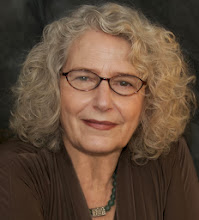
In NYC recently, I was out food shopping on 187th St., only this long staircase interrupts the street for over 100 steps until it reaches the top. Once it's succeeded in getting you to huff and puff, it resumes its identity as a street on which lives
Frank's Gourmet Market, a miniature Whole Foods—neighborhood style—with everything and anything you could want from a health foods store mixed in with enough of the usual essential suspects you might find in a major supermarket chain.
All over Italy, especially in Perugia, streets become long climbing staircases taking you from one level in a hilly town to the next one, or to a Piazza you never thought was there before you climbed. The last time I climbed such an Umbrian staircase, I rewarded myself with the moscarpone-rich Teramisú, my favorite aorta-stopping Italian delicacy—often imitated and very rarely duplicated to satisfaction.
Something about climbing those stairs transformed Washington Heights, NYC, into a "foreign" experience, pushing not only my heart beat but my perceptions beyond the usual steps I take in my level walks along the Charles River here in Boston. The NYC stairs pushed me to a place way past my comfort zone—that place we all must climb to in order to move forward in our lives. Outside the comfort zone. Where the unpredictable, the unannounced, the unknown waits with every increasing step, carrying us to and through an altitude of fear. Still we do it. Over and over again.

A couple of days later, I found myself reunited with some friends at
MOMA to see an Italian movie: Una Vita Difficile (A difficult life). The skeleton you see hanging in a large room was assembled from dried and abandoned whale bones the Mexican artist Orozco and his assistants created using thousands of lead pencils to draw concentric patterns on the skeleton, to make his mark, his commentary on what is. To embroider it somehow with his human print.

And so we do the same with each step into the unknown, we imprint it with everything we know from what came before in our lives, sometimes in neat concentric patterns based on what we think we're supposed to do and think and feel. Still the larger form of "destiny" or "fate" casts its shadow over us, ignoring the scribblings of our plans and schemes. Maybe it's best to watch the shadow play, enjoy the day, and take another step, draw another circle, and say hello to the people we meet climbing, too.
 Keeping close to home this holiday season, I've been pampering myself with lots of head cold fighting remedies. That and staying horizontal most of the time has gone a long way (I'm hoping) to prevent a major flu/cold event. Still, I answered a bit of cabin fever with a lovely walk yesterday late afternoon and saw plenty of signs of winter mixed in with images that I usually think of as signs of spring. Maybe life's like that: just when we think we know what the script is for something or someone, an unexpected sign crosses our path and we're not sure how to file it away in the stories we tell ourselves. Best stop telling stories and just enjoy the unexpected: pussy willows and robins in early winter, blizzards in the spring. Rather than go on and on with words, I'll show you scenes from yesterday's walk, then get back to another cup of hot lemonade.
Keeping close to home this holiday season, I've been pampering myself with lots of head cold fighting remedies. That and staying horizontal most of the time has gone a long way (I'm hoping) to prevent a major flu/cold event. Still, I answered a bit of cabin fever with a lovely walk yesterday late afternoon and saw plenty of signs of winter mixed in with images that I usually think of as signs of spring. Maybe life's like that: just when we think we know what the script is for something or someone, an unexpected sign crosses our path and we're not sure how to file it away in the stories we tell ourselves. Best stop telling stories and just enjoy the unexpected: pussy willows and robins in early winter, blizzards in the spring. Rather than go on and on with words, I'll show you scenes from yesterday's walk, then get back to another cup of hot lemonade.






















































